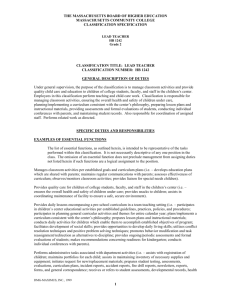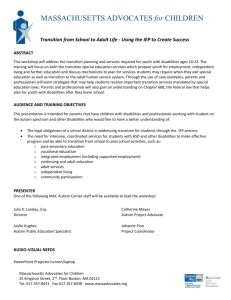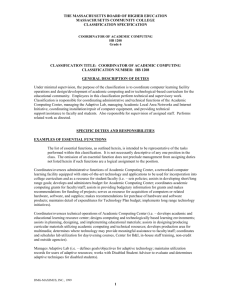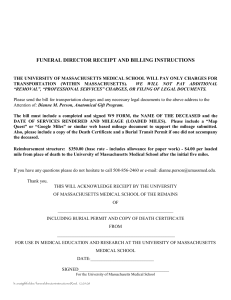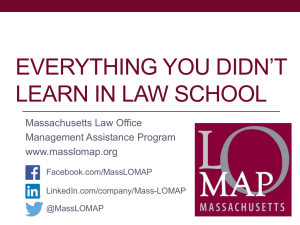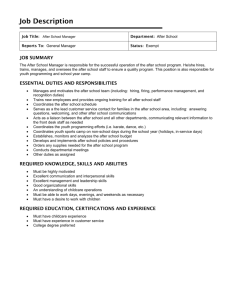Learning Disabilities Specialist-Transition
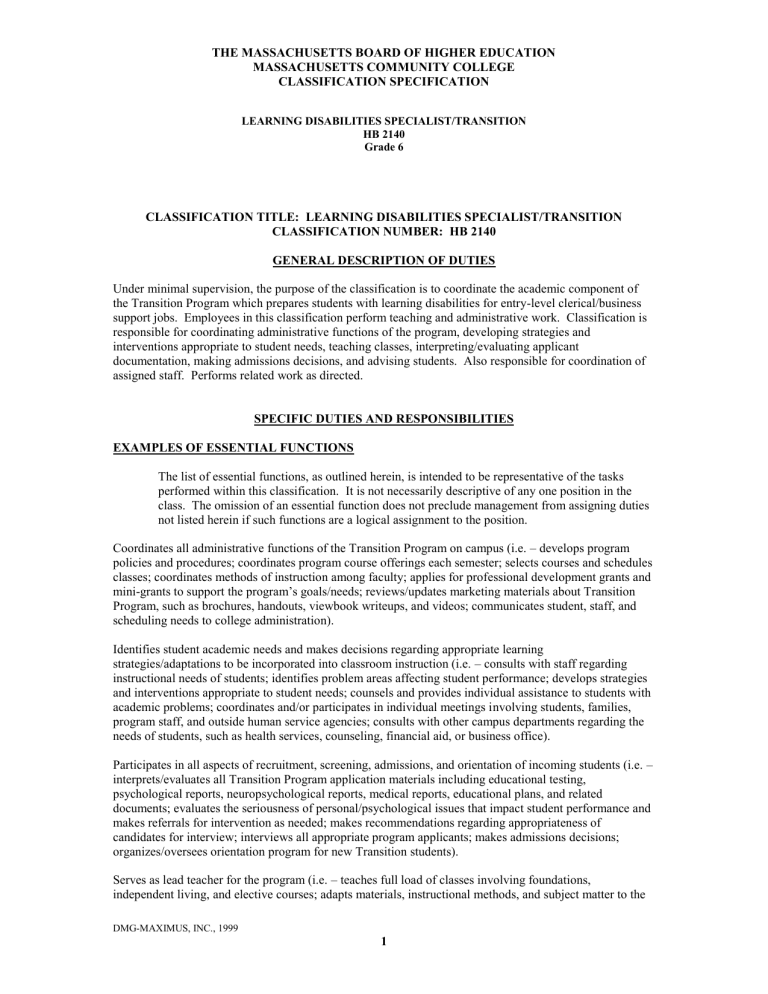
THE MASSACHUSETTS BOARD OF HIGHER EDUCATION
MASSACHUSETTS COMMUNITY COLLEGE
CLASSIFICATION SPECIFICATION
LEARNING DISABILITIES SPECIALIST/TRANSITION
HB 2140
Grade 6
CLASSIFICATION TITLE: LEARNING DISABILITIES SPECIALIST/TRANSITION
CLASSIFICATION NUMBER: HB 2140
GENERAL DESCRIPTION OF DUTIES
Under minimal supervision, the purpose of the classification is to coordinate the academic component of the Transition Program which prepares students with learning disabilities for entry-level clerical/business support jobs. Employees in this classification perform teaching and administrative work. Classification is responsible for coordinating administrative functions of the program, developing strategies and interventions appropriate to student needs, teaching classes, interpreting/evaluating applicant documentation, making admissions decisions, and advising students. Also responsible for coordination of assigned staff. Performs related work as directed.
SPECIFIC DUTIES AND RESPONSIBILITIES
EXAMPLES OF ESSENTIAL FUNCTIONS
The list of essential functions, as outlined herein, is intended to be representative of the tasks performed within this classification. It is not necessarily descriptive of any one position in the class. The omission of an essential function does not preclude management from assigning duties not listed herein if such functions are a logical assignment to the position.
Coordinates all administrative functions of the Transition Program on campus (i.e. – develops program policies and procedures; coordinates program course offerings each semester; selects courses and schedules classes; coordinates methods of instruction among faculty; applies for professional development grants and mini-grants to support the program’s goals/needs; reviews/updates marketing materials about Transition
Program, such as brochures, handouts, viewbook writeups, and videos; communicates student, staff, and scheduling needs to college administration).
Identifies student academic needs and makes decisions regarding appropriate learning strategies/adaptations to be incorporated into classroom instruction (i.e. – consults with staff regarding instructional needs of students; identifies problem areas affecting student performance; develops strategies and interventions appropriate to student needs; counsels and provides individual assistance to students with academic problems; coordinates and/or participates in individual meetings involving students, families, program staff, and outside human service agencies; consults with other campus departments regarding the needs of students, such as health services, counseling, financial aid, or business office).
Participates in all aspects of recruitment, screening, admissions, and orientation of incoming students (i.e. – interprets/evaluates all Transition Program application materials including educational testing, psychological reports, neuropsychological reports, medical reports, educational plans, and related documents; evaluates the seriousness of personal/psychological issues that impact student performance and makes referrals for intervention as needed; makes recommendations regarding appropriateness of candidates for interview; interviews all appropriate program applicants; makes admissions decisions; organizes/oversees orientation program for new Transition students).
Serves as lead teacher for the program (i.e. – teaches full load of classes involving foundations, independent living, and elective courses; adapts materials, instructional methods, and subject matter to the
DMG-MAXIMUS, INC., 1999
1
THE MASSACHUSETTS BOARD OF HIGHER EDUCATION
MASSACHUSETTS COMMUNITY COLLEGE
CLASSIFICATION SPECIFICATION
LEARNING DISABILITIES SPECIALIST/TRANSITION
HB 2140
Grade 6 interests, needs, and abilities of individual students; prepares lessons and grades daily assignments and projects; monitors student performance and attendance and sends written warnings if needed; assesses each student’s strengths/weaknesses and writes evaluations of classroom performance; coordinates compilation of complete student evaluations).
Serves as academic counselor for assigned students (i.e. – advises and counsels individual students; assists students with the registration process; assists students in adjusting to college life and exhibiting appropriate behaviors; communicates Transition Program components and requirements to parents, students, teachers, agencies, and other professionals; describes the Transition Program campus experience at information sessions on campus and at area high schools).
Performs administrative tasks associated with department activities (i.e. – prepares annual reports, incident reports, instructional materials, student evaluations, attendance warnings, classroom requests, statistical data, agendas, meeting notes, reports, forms, and general correspondence; receives or refers to educational testing, individualized educational plans, psychological reports, neuropsychological reports, medical reports, vocational evaluations, transcripts, student evaluations, curriculum materials, statistical reports, schedules, handbooks, policies, laws, publications, textbooks, catalogs, manuals, and reference materials; operates a computer and utilizes word processing, database, e-mail, Internet, or other software programs).
Interacts with various agencies/individuals (i.e. – attends meetings and participates on committees; advises director of instruction/delivery issues or other self-paced learning issues; assists in promoting the self-paced format; communicates with supervisor, employees, other departments, students, parents, faculty members, counselors, other academic institutions, medical providers, community agencies, the public, outside agencies, and other individuals to coordinate activities, review status of work, exchange information, or resolve problems).
Coordinates activities of assigned staff (i.e. – oversees activities of program faculty; provides input for hiring of new program staff; trains new program staff; coordinates/facilitates staff meetings; instructs assigned staff in performance of duties according to established standards; plans the work of others and allocates personnel; prioritizes, assigns, reviews, and coordinates work; assists with complex or problem situations and provides direction).
Maintains professional knowledge in applicable areas (i.e. – maintains a working knowledge of assigned area; researches new trends and advances in the profession; reads professional literature; attends conferences, workshops, and training sessions).
MARGINAL FUNCTIONS
While the following tasks are necessary for the work of the unit, they are not an essential part of the purpose of this position and may also be performed by other unit members.
Performs miscellaneous tasks (i.e. – proctors exams and assists with departmental needs; represents the
Transition Program at college fairs; conducts campus tours as part of program information sessions; assists with mailings for information sessions; answers telephones and provides information).
Performs related duties as directed.
MINIMUM TRAINING AND EXPERIENCE
DMG-MAXIMUS, INC., 1999
2
THE MASSACHUSETTS BOARD OF HIGHER EDUCATION
MASSACHUSETTS COMMUNITY COLLEGE
CLASSIFICATION SPECIFICATION
LEARNING DISABILITIES SPECIALIST/TRANSITION
HB 2140
Grade 6
Master’s degree in Special Education, Psychology or closely related field; with five (5) years experience and/or training that includes teaching students with learning disabilities and cognitive limitations, administering/interpreting educational and psychological tests, curriculum development, and program administration; or an equivalent combination of education, training, and experience.
SPECIAL REQUIREMENTS
This classification has no special requirements.
PERFORMANCE APTITUDES
Data Utilization : Requires the ability to evaluate, audit, deduce, and/or assess data using established criteria. Includes exercising discretion in determining actual or probable consequences and in referencing such evaluation to identify and select alternatives.
Human Interaction : Requires the ability to inform and guide others by applying principles of professional counseling in addressing specific situations.
Equipment, Machinery, Tools, and Materials Utilization : Requires the ability to operate, maneuver and/or control the actions of equipment, machinery, tools, and/or materials used in performing essential functions.
Verbal Aptitude : Requires the ability to utilize a wide variety of reference, descriptive, advisory and/or design data and information.
Mathematical Aptitude : Requires the ability to perform addition, subtraction, multiplication and division; ability to calculate decimals and percentages; may include ability to perform mathematical operations involving basic algebraic principles and formulas, and basic geometric principles and calculations.
Functional Reasoning : Requires the ability to apply principles of influence systems, such as motivation, incentive, and leadership, and to exercise independent judgment to apply facts and principles for developing approaches and techniques to resolve problems.
Situational Reasoning : Requires the ability to exercise judgment, decisiveness and creativity in situations involving the evaluation of information against sensory, judgmental, or subjective criteria, as opposed to that which is clearly measurable or verifiable.
ADA COMPLIANCE
Physical Ability : Tasks require the ability to exert light physical effort in sedentary to light work, but which may involve some lifting, carrying, pushing and/or pulling of objects and materials of light weight.
Sensory Requirements : Some tasks require the ability to perceive and discriminate visual cues or signals.
Some tasks require the ability to communicate orally.
Environmental Factors : Essential functions are regularly performed without exposure to adverse environmental conditions.
DMG-MAXIMUS, INC., 1999
3
THE MASSACHUSETTS BOARD OF HIGHER EDUCATION
MASSACHUSETTS COMMUNITY COLLEGE
CLASSIFICATION SPECIFICATION
LEARNING DISABILITIES SPECIALIST/TRANSITION
HB 2140
Grade 6
The Massachusetts Board of Higher Education – Massachusetts Community College is an Equal
Opportunity Employer. In compliance with the Americans with Disabilities Act, The Massachusetts Board of Higher Education – Massachusetts Community College will provide reasonable accommodations to qualified individuals with disabilities and encourages both prospective and current employees to discuss potential accommodations with the employer.
DMG-MAXIMUS, INC., 1999
4

